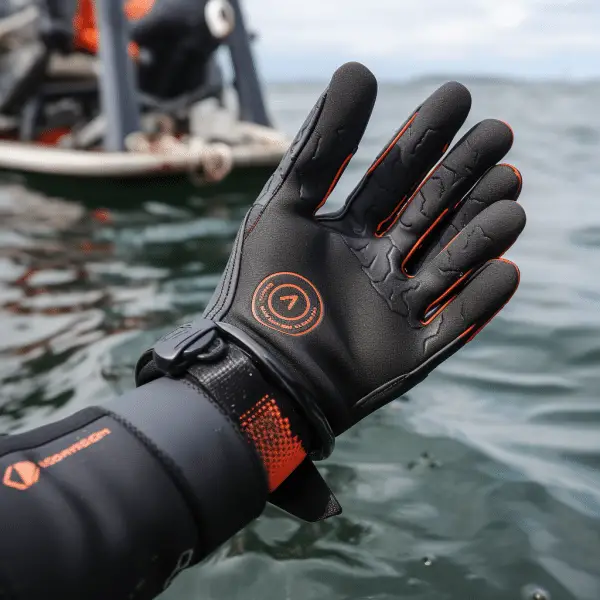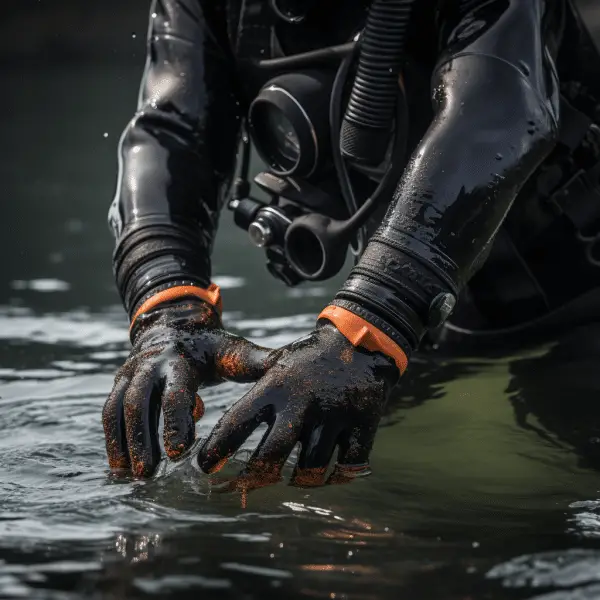Dive gloves are an essential accessory for scuba divers, providing protection, thermal insulation, and enhanced dexterity underwater. In cold water diving, dive gloves are even more crucial as they help to prevent the loss of feeling and clumsiness that can occur when hands get cold. It is important to choose the right dive gloves for cold water conditions to ensure maximum comfort and safety during your dives.
Neoprene is the preferred material for dive gloves as it is stretchy, lightweight, waterproof, and insulating. The thickness of the gloves should vary based on the water temperature, with options ranging from thin lycra gloves for warmer waters to 5mm or 7mm gloves for colder conditions. Additional features to consider include rubberized palm and finger coatings for better grip, protective materials like Kevlar or titanium mesh for added durability, and wrist straps for a secure fit.
By investing in a high-quality pair of dive gloves designed specifically for cold water, you can stay warm and protected while exploring the wonders beneath the surface.
Key Takeaways:
- Dive gloves are essential for cold water diving, providing protection, thermal insulation, and enhanced dexterity.
- Neoprene is the preferred material for dive gloves due to its stretchiness, lightweight, waterproof, and insulating properties.
- The thickness of the gloves should be selected based on the water temperature, with options ranging from thin lycra gloves for warmer waters to 5mm or 7mm gloves for colder conditions.
- Additional features like rubberized palm and finger coatings, Kevlar or titanium mesh, and wrist straps can enhance grip, durability, and fit.
- Choose high-quality dive gloves designed specifically for cold water diving to ensure maximum comfort and safety.
Gear up with the best dive gloves for cold water and dive in confidently!
Factors to Consider When Choosing Dive Gloves for Cold Water

When selecting dive gloves for cold water, there are several key factors to consider. First and foremost is the level of thermal insulation the gloves provide. Cold water dive gloves should have sufficient thickness to keep your hands warm, with options ranging from 5mm to 7mm neoprene gloves for extra cold water conditions. It is also important to ensure that the gloves offer a good level of comfort, as you will be wearing them for extended periods of time.
Dexterity is another important consideration, as you need to be able to perform tasks such as operating your dive gear and communicating with your diving buddy. Look for gloves that offer good grip and flexibility, with features like rubberized palms and finger coatings. Durability is also key, especially if you will be diving in challenging environments like wrecks or rocky areas. Gloves with reinforced materials like Kevlar or nitrile can provide added protection and longevity.
By carefully considering these factors, you can choose the best dive gloves for cold water that meet your needs and enhance your diving experience.
Comparison of Dive Gloves for Cold Water

| Glove Brand | Material | Thickness | Dexterity Level | Durability |
|---|---|---|---|---|
| Brand A | Neoprene | 5mm | High | Medium |
| Brand B | Neoprene | 7mm | Medium | High |
| Brand C | Neoprene | 5mm | High | High |
Table: Comparison of dive gloves for cold water. This table highlights the differences in glove material, thickness, dexterity level, and durability among popular brands. Brand A offers a good balance between thickness and dexterity, while Brand B provides maximum thickness for extra cold conditions. Brand C stands out with both high dexterity and durability, making it suitable for challenging diving environments.
By referring to this comparison table and considering your specific needs, you can make an informed decision when choosing dive gloves for cold water.
Conclusion
Dive gloves are an essential accessory for cold water diving, providing protection, thermal insulation, and enhanced dexterity. By choosing the right pair of dive gloves, you can ensure maximum comfort and safety during your underwater adventures.
Neoprene dive gloves are the preferred choice for cold water conditions due to their stretchiness, lightweight, waterproof, and insulating properties. They effectively keep your hands warm and protect against abrasion, cuts, and stings from marine life.
When selecting dive gloves, consider the water temperature and choose the appropriate thickness. For warmer waters, thin lycra gloves may suffice, while for colder conditions, 5mm or 7mm neoprene gloves are recommended.
Additional features such as rubberized palm and finger coatings, Kevlar or titanium mesh, and wrist straps can enhance grip, durability, and fit. Investing in high-quality, cold water snorkeling gloves designed specifically for cold water diving will ensure that you stay warm and protected while exploring the wonders of the underwater world.
FAQ
What are dive gloves used for in cold water diving?
Dive gloves in cold water diving provide protection, thermal insulation, and enhanced dexterity. They help prevent the loss of feeling and clumsiness that can occur when hands get cold.
What material is preferred for dive gloves in cold water?
Neoprene is the preferred material for dive gloves in cold water. It is stretchy, lightweight, waterproof, and insulating.
What thickness should dive gloves be for cold water conditions?
The thickness of dive gloves for cold water conditions should vary based on the water temperature. Options range from thin lycra gloves for warmer waters to 5mm or 7mm gloves for colder conditions.
What additional features should I consider when choosing dive gloves for cold water?
Additional features to consider include rubberized palm and finger coatings for better grip, protective materials like Kevlar or titanium mesh for added durability, and wrist straps for a secure fit.
How do I choose the best dive gloves for cold water?
When choosing dive gloves for cold water, factors to consider include thermal insulation, comfort, dexterity, grip, flexibility, durability, and fit. Select gloves that meet your specific needs and enhance your diving experience.
